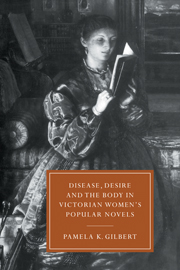Book contents
- Frontmatter
- Contents
- Acknowledgments
- Introduction
- 1 “In the body of the text”: metaphors of reading and the body
- 2 Genre: the social construction of sensation
- 3 M. E. Braddon: sensational realism
- 4 Rhoda Broughton: anything but love
- 5 Ouida: romantic exchange
- Afterword: the other Victorians
- Notes
- Bibliography
- Index
- CAMBRIDGE STUDIES IN NINETEENTH-CENTURY LITERATURE AND CULTURE
Introduction
Published online by Cambridge University Press: 16 November 2009
- Frontmatter
- Contents
- Acknowledgments
- Introduction
- 1 “In the body of the text”: metaphors of reading and the body
- 2 Genre: the social construction of sensation
- 3 M. E. Braddon: sensational realism
- 4 Rhoda Broughton: anything but love
- 5 Ouida: romantic exchange
- Afterword: the other Victorians
- Notes
- Bibliography
- Index
- CAMBRIDGE STUDIES IN NINETEENTH-CENTURY LITERATURE AND CULTURE
Summary
Hayden White, among others, observes that the narration of history is determined more by the needs of the historian than intrinsic properties of historical data. Regarding the burgeoning critical fascination with transgression and boundaries, as evidenced by the work of Peter Stallybrass and Allon White, Donna Haraway and many others, it is justifiable to ask, not only why boundary transgression is such as central metaphor in the periods we study, but why it is such a central – almost obsessive – concern to us now. We see it, most obviously, in the discourse on AIDS. Yet it is prevalent everywhere, from abortion rights (where does the individual body end and the social body begin?) to information security (in what consists the boundary between private and public?). In the rapidly shifting international political climate, as in the multicultural US, we see it in the obsessive attempts to categorize and rename, adding strings of adjectives in an attempt to “get it right,” only to discover that identity is fluid and multiple, and resists naming. From national boundaries under dispute to the attempts of multinational corporations to disentangle their agendas from other interests, from feminist attempts to speak for “all women” to the efforts of women of color and lesbians to be heard as distinct, but still collective voices, identity politics consist of a quest to distinguish the Self from the Other, only to discover a multitude of others and a myriad of selves. In a global economy and ecology, wherein cultural and communicative structures become ever more immediate and diffuse, the terms “national” and “individual” lose meaning as rapidly as do terms like “private” or “woman.”
- Type
- Chapter
- Information
- Publisher: Cambridge University PressPrint publication year: 1997

